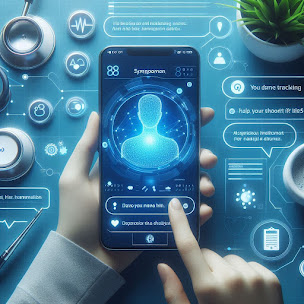Introduction:
 |
| Dynamic healthcare scene depicting advanced AI technology integration |
Artificial Intelligence is basically changing the healthcare landscape, making innovative solutions that increase the accuracy of diagnosis, personalizing treatments, and improving treatment for the patient. From machine learning and data analytics to neural networks, AI technology has come to represent a critical element in solutions to address health's biggest challenges-from early disease detection to delivering tailored treatment. Whether about transforming from conducting early disease detections to delivering customized treatment, AI has always been redefining how healthcare is delivered globally.
Early Detection of Diseases
AI is used to identify diseases at their earliest stages, where treatment is most effective. For example:
- Mammography devices equipped with AI can identify breast cancer more accurately.
- Retinal image systems employ deep learning in identifying early signs of diabetic retinopathy.
Improving Accuracy and Reducing Errors:
 |
| high-tech scene of an AI system working alongside a radiologist |
Medical images and data are assessed by AI algorithms at a speed and accuracy level that is beyond human capabilities, reducing diagnostic errors. Some examples include
- IBM Watson Health assisting radiologists with faster imaging interpretations.
- Google's Deep Mind has identified over 50 eye diseases with an accuracy close to leading ophthalmologists.
Case Study: AI in Diagnostics:
In a recent study, AI-powered platforms like Zebra Medical Vision demonstrated an ability to analyze millions of X-rays, providing quicker and more accurate diagnoses for radiologists globally.
AI in Personalized Medicine:
Role of Genomics in Tailored Treatments
 |
| Engaging representation of a DNA strand with AI data overlays |
These AI machines decipher intricate genetic information to formulate patient-specific treatment plans. Platforms like 23andMe use AI to analyze DNA for actionable health insights.
Predictive Analytics for Better Outcomes
AI-based predictive models monitor the reaction of patients to therapy and enable the doctor to refine the plan of care. Tools such as Tempus integrate clinical data with AI for oncology treatment guidance.
Personalized Cancer Therapies
AI-based solution such as PathAI has saved cancer treatment in identifying the best medication for each patient.
AI in Patient Care:
Virtual Health Assistants
 |
| Virtual Health Assistants |
AI chatbots, such as Ada and Babylon Health, help patients track symptoms, remind them of their medication, and give them information about their health.
Remote Monitoring and Wearables
Wearable devices like Fitbit and Apple Watch use AI to monitor real-time health metrics with the aim of providing insights into chronic disease management.
Telemedicine and AI Integration
AI enhances telemedicine in the sense that it makes remote consultations better. For example, systems can record and review consultations to suggest subsequent visits.
Ethical and Practical Challenges:
Data Privacy Issues
AI is extremely dependent on healthcare data that raises privacy and confidentiality issues. There is a need for some proper measures in place.
Algorithm Bias in Health Care
The algorithm of AI can perpetuate bias in training data. This results in the unfair provision of healthcare to marginalized people.
Cost and Access Restrictions
High development and deployment costs may further discourage AI access in remote areas.
Enhancements in Detection and Therapy
Trends such as AI surgical robots and disease prediction algorithms in real-time will improve healthcare efficiency.
A Healthcare Revolution for All
AI can make healthcare more egalitarian by spreading healthcare services to the remote and unreached population through telemedicine and portable diagnostic tools.
Conclusion:
Health care is being revolutionized by AI. It is more efficient, personalized, and accessible. However, data security, as well as issues of cost barriers, must be addressed to tap into its full potential. More development of this technology will mean much more for the diagnostics, personalized medicine, and patient care, all promising a healthier future ahead.
Call to Action: Explore how AI could shape your health care journey and lead to a more individualized medical future.


.jpeg)



No comments:
Post a Comment